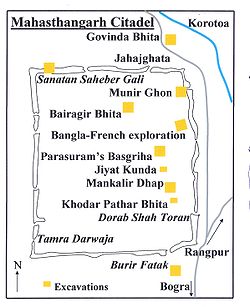Mahasthana Inscription
This article or section is in the process of an expansion or major restructuring, and is not yet ready for use. You are welcome to assist in its construction by editing it as well. If this article or section has not been edited in several days, please remove this template. If you are the editor who added this template and you are actively editing, please be sure to replace this template with {{in use}} during the active editing session. Click on the link for template parameters to use.
This article was last edited by Bharatwiki Socrates (talk | contribs) 9 months ago. (Update timer) |
মহাস্থানগড় | |
 Ramparts of the Mahasthangarh citadel | |
| Location | Mahasthan, Bogra District, Rajshahi Division, Bangladesh |
|---|---|
| Type | Settlement |
| History | |
| Founded | Not later than 3rd century BC |
| Abandoned | 8th century AD |
Inscriptions: A 4.4 cm x 5.7 cm limestone slab bearing six lines in Prakrit in Brahmi script, discovered accidentally by a day labourer in 1931 was an important find. The text appears to be a royal order of Magadh, possibly during the rule of Asoka. It dates the antiquity of Mahasthangarh to 3rd century BC. An Arabic inscriptional slab of 1300–1301 discovered in 1911–12 mentions the erection of a tomb in honour of Numar Khan, who was a Meer-e-Bahar (lieutenant of the naval fleet). A Persian inscriptional slab of 1718–19 records the construction of a mosque during the reign of the Mughal Emperor Farrukhsiyar.[1]

Mahasthangarh is the earliest urban archaeological sites discovered thus far in Bangladesh. The village Mahasthan in Shibganj upazila of Bogra District contains the remains of an ancient city which was called Pundranagara or Paundravardhanapura in the territory of Pundravardhana.[2][3][4] A limestone slab bearing six lines in Prakrit in Brahmi script recording a land grant, discovered in 1931, dates Mahasthangarh to at least the 3rd century BCE.[5][6] It was an important city under the Maurya Empire. The fortified area was in use until the 8th century CE.[3]
Geography
Coordinates: 24°58′N 89°21′E / 24.96°N 89.35°EMahasthangarh, the ancient capital of Pundravardhana is located 11 km (7 mi) north of Bogra on the Bogra-Rangpur highway, with a feeder road (running along the eastern side of the ramparts of the citadel for 1.5 km) leading to Jahajghata and site museum.[7]
- Some sources to use in this article later..
https://archive.org/details/ancient-india_202301/page/96/mode/2up?q=%22Mahasthana+Inscription%22
Mahasthana Inscription, Ep. Ind., Volume XXI.
- Most Important
Mahasthan Record Revisited By Susmita Basu Majumdar · 2023 https://www.google.co.in/books/edition/Mahasthan_Record_Revisited/E0e1EAAAQBAJ?hl=en&gbpv=1
Mahasthan, A Preliminary Report on Archaeological Excavations By Nazimuddin Ahmad · 1971
- ↑ Hossain, Md. Mosharraf, pp. 56–65.
- ↑ Hossain, Md. Mosharraf (2006). "Preface". Mahasthan: Anecdote to History. Dhaka: Dibyaprakash. ISBN 978-984-483-245-9.
Mahasthan is the earliest urban archaeological site so far discovered in the present territory of ... Bangladesh
- ↑ 3.0 3.1 Brochure: Mahasthan – the earliest city-site of Bangladesh, published by the Department of Archaeology, Ministry of Cultural Affairs, Government of the People’s Republic of Bangladesh, 2003
- ↑ Majumdar, R. C. (1971). History of Ancient Bengal. Calcutta: G. Bhardwaj & Co. pp. 5, 13. OCLC 961157849.
- ↑ Cite error: Invalid
<ref>tag; no text was provided for refs namedSH - ↑ Hossain, Md. Mosharraf, pp. 56–60.
- ↑ Hossain, Md. Mosharraf, pp. 14–15.
- ↑ Raychaudhuri, Hemchandra (1996). Political history of ancient India : from the accession of Parikshit to the extinction of the Gupta dynasty. Internet Archive. Delhi ; New York : Oxford University Press. p. 275. ISBN 978-0-19-563789-2.
Mahasthan inscription which is usually attributed to Mauryan period
- ↑ Ram Charan Sharma (1978). Ancient India. pp. 96–97.
In Bangladesh, where we find the Mahasthana inscription at Bogra district in Maurya Brahmi, we find NBP at Bangarh in, Dmajpur district. NBP sherds have also bean found at some places, such as Chandraketugarh in the 24 Parganas, in West Bengal.


